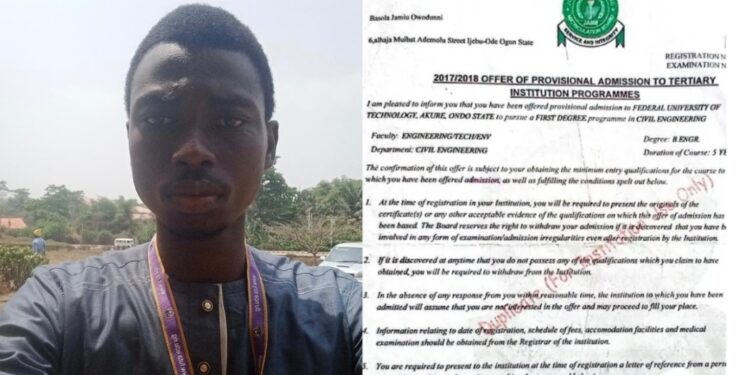Following the recent news report detailing the travails of Basola Jamiu Owodunni, a graduate of the Federal University of Technology, Akure (FUTA), whose admission was disclaimed by the Joint Admissions and Matriculation Board (JAMB), concerned Nigerians have taken to various platforms to express frustration and disappointment over the situation. The development has stirred national debate on the efficiency of JAMB, the validity of institutional autonomy, and the fate of countless Nigerian graduates caught in similar bureaucratic webs.
As earlier reported by The Punch, Basola, who graduated with a Cumulative Grade Point Average of 4.41 in Civil Engineering in 2024, was shocked to discover after final clearance that he could not proceed to the National Youth Service Corps (NYSC) because his name was marked “fake admission” on the JAMB matriculation list. Despite presenting evidence of his time and performance at FUTA, and support from the institution’s admissions office, JAMB insisted his details were missing from its Central Admissions Processing System (CAPS).
The Board, in a statement signed by its Public Communication Adviser, Dr Fabian Benjamin, maintained that Basola was not admitted through due process, disassociating itself from any responsibility in the matter. The board further claimed it could not “insert him on the platform” and requested that he disclose how he obtained what it described as a questionable admission letter.
This development triggered widespread reactions, especially on social media, with many commentators condemning JAMB’s stance and urging systemic reform.
Citizens Demand Reform, Empathy, and Clarity
One of the more critical voices came from Leke Akindele, who commented:
“Despite JAMB not being a revenue-generating agency, it is no brainer that if the Professor had devoted half of the humongous sums he remits to federal coffers to address the inadequacies facing JAMB, all these serial lapses would have been curtailed.
Moreover, it won’t be a bad idea if JAMB is scrapped and tertiary institutions are allowed to conduct their admission.”
Another concerned Nigerian, Omolayo Emmanuel, highlighted the academic rigour involved:
“A CGPA of 4.41 in FUTA is equivalent to 5.0 in some other universities, so I understand what this guy must have put into study to have gathered such a point.
Make JAMB no go do something wey go make them ‘Jamb’ moto o.”
Chwuemeka E. criticised the institutional rigidity of the board, stating:
“This is sad. He has a valid SSCE and has proven his competence by graduating from the university after years of rigorous tests and training. These years of hard work and training shouldn’t be allowed to go to waste because of the bureaucratic inconsistency of an entity that has outlived its usefulness.”
For Sylvester Forcados, the solution should be straightforward:
“For me, this shouldn’t be an issue. JAMB should contact the university to confirm if he was their legitimate student and whether his GPA is correct. Then do the needful by correcting the records—simple as that.”
A Wider Problem: Not an Isolated Case
Maryann Eze shared a personal connection to the problem, stating her sister is facing a similar ordeal:
“My sister is currently having the same issues.
She finished from UNN and is yet to be deployed for NYSC. Her own issue is that she did a change of course in second year from Education to Mass Communication. JAMB is yet to regularise her admission and her name is yet to be sent to NYSC—even after graduating with a 2.1.
She has visited JAMB offices in Lagos and Abuja, but nothing has been done. The school confirmed they have sent her request to JAMB a long time ago. But no resolution still.”
Oluwadamilola Ajayi questioned the lack of institutional checks that should have identified irregularities much earlier:
“I always thought there is a clearance or screening done in year three, or a year before the finals, as the case may be.
In UNIBEN, you would get all your originals screened and be given one yellow slip to validate your eligibility as a student. If there was anything amiss during this process, you could lose your admission there. If this was done and this guy still made it to finals, then JAMB is the problem and should proffer a solution to it.”
Systemic Injustice or Oversight?
The FUTA graduate’s case has now evolved beyond an individual misfortune—it has become a symbol of the frustration faced by many Nigerian students who fall victim to institutional failures. As more testimonies emerge, there are growing calls for JAMB to not only address this specific case but to overhaul its internal systems, improve communication with institutions, and ensure that no diligent student is robbed of a future due to bureaucratic gaps.
As the debate continues, all eyes remain on JAMB and the Federal Ministry of Education for possible intervention—and most importantly, resolution for Basola and others in similar straits.
A Personal Note
Commenting on the matter, Folaranmi Ajayi, an education journalist and youth advocate, wrote:
“This isn’t just about Basola. It’s about hundreds, maybe thousands, of Nigerian students whose dreams might be silenced not by failure, but by faulty systems. What is the worth of a 4.41 CGPA, earned through years of dedication, if it can be erased by a bureaucratic oversight?
I believe the real reform starts with accountability from institutions, regulators, and leadership. Until our systems begin to treat young Nigerians with dignity, more Basolas will emerge, bearing the cost of a broken structure they never created.”



















































































 EduTimes Africa, a product of Education Times Africa, is a magazine publication that aims to lend its support to close the yawning gap in Africa's educational development.
EduTimes Africa, a product of Education Times Africa, is a magazine publication that aims to lend its support to close the yawning gap in Africa's educational development.